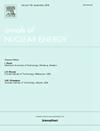正确处理核工程中贝叶斯更新问题模型输入参数的框架
IF 1.9
3区 工程技术
Q1 NUCLEAR SCIENCE & TECHNOLOGY
引用次数: 0
摘要
贝叶斯更新(BU)工具越来越多地用于核工程中的反向不确定性量化(IUQ)和校准以及不确定性降低。其目标是量化或减少某些不确定模型输入参数的不确定性。由于可用的实验数据通常只允许更新影响最大的输入参数,因此研究人员在进行 BU 时往往会忽略不太重要的参数。本文探讨了忽略未校准模型输入参数(UMIP)不确定性的后果。本文还提出了如何正确地包含这些不确定性,以及哪些 BU 算法是各类逆问题的最佳选择。分析基于对两个玩具问题和一个核工程中的乘法因子计算问题的探讨。结果清楚地表明,BU 期间对 UMIP 的不当处理往往会导致低估后验不确定性--无论是校准输入参数还是模拟积分参数的后验不确定性,这取决于 BU 是如何进行的。所提出的正确处理 UMIP 的方法将提高 BU 过程的严谨性,并增强对所得后验分布的信心。本文章由计算机程序翻译,如有差异,请以英文原文为准。
Framework for the correct treatment of model input parameters for Bayesian updating problems in nuclear engineering
Bayesian updating (BU) tools are increasingly used in nuclear engineering for inverse uncertainty quantification (IUQ) and calibration combined with uncertainty reduction. Their goals are quantifying or reducing the uncertainty of some of the uncertain model input parameters. Since it is often the case that available experimental data only allows for updating the most influential input parameters, researchers often ignore the less important ones during BU. This paper explores the consequences of neglecting the uncertainties of uncalibrated model input parameters (UMIP). It also proposes how to include them properly and which BU algorithms are the best choices for various types of inverse problems. The analysis is based on exploring two toy problems and one in nuclear engineering concerning multiplication factor calculations. The results clearly show that the improper treatment of UMIP during BU often leads to underestimating posterior uncertainties — either of the calibrated input parameters or the simulated integral parameters, depending on how the BU was conducted. The proposed methods of correct UMIP treatment will improve the rigorousness of the BU processes and boost confidence in the resulting posterior distributions.
求助全文
通过发布文献求助,成功后即可免费获取论文全文。
去求助
来源期刊

Annals of Nuclear Energy
工程技术-核科学技术
CiteScore
4.30
自引率
21.10%
发文量
632
审稿时长
7.3 months
期刊介绍:
Annals of Nuclear Energy provides an international medium for the communication of original research, ideas and developments in all areas of the field of nuclear energy science and technology. Its scope embraces nuclear fuel reserves, fuel cycles and cost, materials, processing, system and component technology (fission only), design and optimization, direct conversion of nuclear energy sources, environmental control, reactor physics, heat transfer and fluid dynamics, structural analysis, fuel management, future developments, nuclear fuel and safety, nuclear aerosol, neutron physics, computer technology (both software and hardware), risk assessment, radioactive waste disposal and reactor thermal hydraulics. Papers submitted to Annals need to demonstrate a clear link to nuclear power generation/nuclear engineering. Papers which deal with pure nuclear physics, pure health physics, imaging, or attenuation and shielding properties of concretes and various geological materials are not within the scope of the journal. Also, papers that deal with policy or economics are not within the scope of the journal.
 求助内容:
求助内容: 应助结果提醒方式:
应助结果提醒方式:


